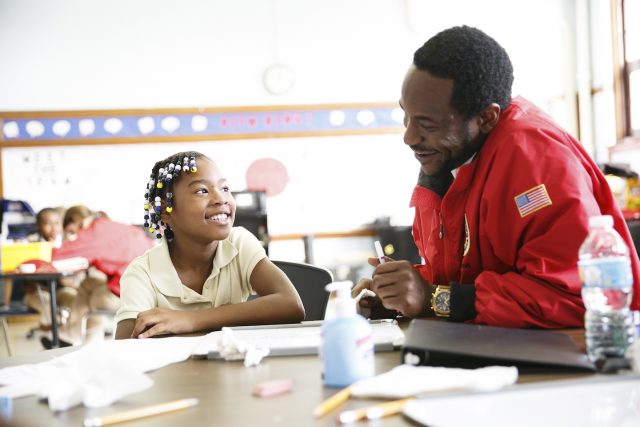Supporting student mental health and wellbeing
Anthony Lawrence is an impact manager for City Year Kansas City, guiding and supporting a team of City Year AmeriCorps members in a local middle school. When he’s not leading a team of 14 AmeriCorps members through a year of service, he spends his time producing and hosting the Tell Me More Podcast—an internet radio program highlights the experiences of corps members, staff and community partners.
members in a local middle school. When he’s not leading a team of 14 AmeriCorps members through a year of service, he spends his time producing and hosting the Tell Me More Podcast—an internet radio program highlights the experiences of corps members, staff and community partners.
In a recent episode, Anthony interviews Elizabeth Stanford, a licensed professional counselor and a trauma-sensitive clinician working in Kansas City schools. They explore how AmeriCorps members, who serve as student success coaches in under-resourced public schools, can responsibly and empathetically care for their students’ mental health and well-being. Stanford also highlights ways that corps members can take care of their mental health through the challenges of service.
Here are some highlights from their conversation on the podcast:
Anthony: I want to ask you about the social stigma around mental health discussions and how it affects our students. Could you tell me a bit about that?
Elizabeth: One huge piece is that, often, we just don’t have the correct language for folks to be able to really engage in a conversation about mental health, and it affects their ability to access the services they need. Like many of our students, I come from a culture where it’s taboo to talk about some of these issues. We keep it hidden from our friends and family.
I think one simple way we can combat that taboo is to create environments where folks can feel comfortable saying, “Hey, I’m not feeling good today.” Something as small as this can make the conversation “normal” to talk about, just as we would talk about lunch, dinner or everyday things.
If we can get our students to understand that everybody experiences highs and lows and cares for their mental health, we can start to disarm that stigma.

AL: How can corps members help address that stigma when they see it come up in service?
ES: To the extent that corps members are comfortable, I’m a big advocate of sharing personal experiences. So, for example, if a student is having a hard time, you can say something like, “You know what, I’ve had to deal with depression too.” Your vulnerability at that moment can help students to open up and share how they’re feeling.
Make sure these moments are authentic and appropriate, so do not make up a statement to get a response from a student.
AL: What are some of the things AmeriCorps members and staff should look out for when caring for student mental health and well-being?
ES: If a student you know well is suddenly withdrawn and isolating themselves from you and others, or is not willing to participate in activities they usually enjoy, that can be a sign that something might not be okay. So, for example, if an ordinarily gregarious student who loves to play and talk about basketball suddenly decides they’re no longer going to basketball practice, check in on them. Something might be going on.
Another thing to look out for is if students start negatively speaking about their self-worth. They might make statements like, “What I say or do doesn’t matter,” or “I don’t even know why I’m still living,” that’s a major red flag and a sign that corps members should help connect that student with professionals who are trained to handle those conversations. This type of engagement, of course, requires that the student already feel safe and trusts the corps member.
AL: At what point do you think a corps member should elevate their concerns about a student and seek help from a school counselor or trauma specialist?
ES: I would say, any time you have concerns about the student harming themselves or others. At that point, you should absolutely seek to connect that student with professional services and elevate the issue immediately.
Even if it’s something less urgent and simply a conversation that makes you uncomfortable because you don’t know what to say, please seek out the professionals in your school community. The last thing we want is for corps members to feel like they’re in a situation they’re not trained to handle.
If a student has confided in you about something but is hesitant about speaking to another adult, we can start by having that corps member bring that student into the office. There, the corps member can introduce the other adult to the student.
The goal here is to make sure that the student understands that you’re not abandoning them or are no longer willing to listen. The student should feel safe with the new adult and that the corps member is supporting them in getting the help they need. We call it a “warm handoff.”
AL: How has the COVID-19 pandemic affected student mental health?
First, I think this pandemic has affected and touched the lives of everyone. I’ve been doing home visits since August 2020, and have seen an increase in anxiety and depression in the students I work with. At the same time, I’ve also seen a decrease in students actively reaching out and ask for help.
I would say that parents are also in a similar boat. They’re feeling overwhelmed and unable to juggle work and their own challenging emotions. This, in addition to helping their children cope and helping to facilitate at-home, virtual learning in some cases—adds up to a hefty load.
Generally, I would like parents and students to know that it’s okay not to be okay, that it’s normal to feel like you’re barely keeping your head above water. Chances are folks around you are experiencing similar things. But just remember to seek out support when necessary and if possible.
AL: What advice would you give to corps members who are simultaneously trying to care for their students and their own mental health and well-being? What self-care tips would you give?
ES: Helping to care for students through their trauma might be triggering for corps members who have dealt with or are still dealing with trauma. Not only are you taking it on, but it might also trigger things from your own life. This is something I encourage corps members to be aware of and keep in mind.
So, I tell everyone—whether you’re a corps member or a teacher—to have a self-care plan. Actively schedule days off, build in time to do hobbies you love or activities you know help you to relieve stress. And don’t just say, have a plan in your head; write it out. You should have it in writing because when you’re in those moments, when you’re feeling stressed, when you’re feeling overwhelmed, those things don’t come to your mind.
And if your self-care plan doesn’t feel like it’s enough, I encourage everyone to seek out therapy and speak to a professional if that service is accessible to you.
Learn more about City Year’s resources to help support AmeriCorps member mental health and well-being:
This interview has been edited for length and clarity. For the full interview and more episodes of the Tell Me More Podcast, click here.
Related stories
Because you'll be living on a stipend, it might be a good idea to hold off on that ottoman from...
Read more about Furnishing your apartment on a budget: Tips for AmeriCorps membersCity Year’s “Why We Matter” podcast explores the vital role of education and mentorship in empowering young people. Through interviews...
Read more about Why City Year’s student success coach network mattersRead more and check the City Year blog to learn the soft skills our corps members gain through a year...
Read more about Top five skills employers want you to have todayIf you speak with an alum of an historically Black college or university (HBCU) about their experience, you’ll quickly learn...
Read more about Serving with City Year sharpens job skills, HBCU graduate says















